- Home
- James Luceno
Memories End Page 7
Memories End Read online
Page 7
Strange nodded and stood up, his head nearly grazing the water-stained acoustic-tile ceiling. “Boys, there's only one thing to do.”
Tech was afraid to ask what that might be.
“We need to pay a visit to the place where you bought Subterfuge. Learning who wrote the pro gram may yield a clue as to Cyrus’ current hiding place.”
“Right!” Marz beamed in enthusiasm and rubbed his hands together.
“And while we're at it, we should pick up the soft we'll need for our run.”
“Run?” Tech asked. “We?”
“Well, of course, ‘we,’ “Strange said matter-of-factly. “I've been out of the game for a long time, Tech. More important, I've never been especially fond of flying in Skander Bulkroad's Network. But with you at my side and your brother at the controls—why, we're practically assured of success.”
Tech continued to gape at him as if Strange were a character from a role-playing game intent on misleading him. “You don't even know anything about us. You haven't even seen us handle a game deck, let alone a cybercraft.”
Deep furrows formed on Strange's brow. “You described yourselves as flyers.”
“Well, yeah, we are,” Tech stammered. “And righteous ones… But Felix doesn't want us flying from the office cybersystem, and our system isn't anywhere near the speed of Felix's.”
Strange wasn't the least bit swayed. “Once we've explained everything to Felix, I'm sure he'll understand.”
“No way,” Marz said.
Strange frowned. “Then we may be forced to fly without his express permission.”
Tech shook his head back and forth. “Network Security slapped an access lock on the system. The lock's going to kick in this afternoon unless Felix pays the fines he owes—which he can't do. Even if he does come up with the money somehow, most of our infiltration software got fried when the system took an amplified hit from the EPA trace.”
Strange stroked his beard. “We can disable the access lock. As for the software, you needn't worry about that.” He pointed to a pair of fifteen-year-old interface helmets outfitted with equally archaic data goggles. “Slip into those for a moment.”
Tech and Marshall snugged the awkward helmets down over their foreheads and adjusted the fit of the data goggles, which had lenses smudged with fingerprints. Tech nudged his brother in the ribs and whispered, “Ancient hardware. Can you believe this guy?”
Marz was examining the helmet closely. “I'll need some motogel, a box of shell screws, and a number-three ratchet. You won't recognize ‘em when I'm done.”
Tech had his mouth open to reply when Strange keyed in a command and a virtual garage appeared in the data goggles. Smaller in size than the garage Marz had created to house the brothers’ collection of custom cybercraft, Strange's featured the same type of roll-up door. Before the door had even risen halfway, Marz sucked in his breath in stunned surprise.
Tech scanned the dozens of software programs floating in front of him. It took him a moment to grasp that Strange's garage wasn't simply some parking space for vehicles, it was a veritable armory of cyberweapons.
• • •
By the time Felix returned to his office, news of Worldwide Cellular's meltdown was all over the TV, the radio, and the Network.
“Millions of people were driven to distraction by their portable phones and beepers earlier today when a pervasive systems malfunction temporarily disabled Worldwide Cellular,” a TV news anchor was saying.
“Cell phones rang for no apparent reason, numbers logged in memory were automatically dialed, people's calls were cut off or switched to other parties, beepers displayed unknown-source numbers or peculiar text messages, some of them obscene.
“An explanation for the crash of Cellular's processor has yet to be given. In a statement delivered at noon Eastern Standard Time, a Cellular spokesperson claimed that the system failure was caused by a faulty relay in the company's geosynchronous orbital satellite. Sources close to Cellular have stated, however, that cyberterrorism has not been ruled out…”
Felix muted the audio and leaned away from his desk, launching a troubled exhalation at the ceiling. Cellular's computer engineers were surely aware that the Virtual Network construct had been penetrated. The fact that word of the illegal penetration hadn't been released to the media suggested just how concerned Cellular was about compromising whatever investigation was under way.
The run had left him shaky. For the entire walk back to his office, jangling cell phones had assailed him from all directions. Felix shuddered to think what might have happened had Magyar Gitana's data been concealed inside the Air Traffic Control construct, New York Hydrogen and Electric Power, or the Stock Market. He could only hope that his cybertalented client had taken all necessary steps to prevent Cellular from tracing the penetration to Virtual Horizons and to Network tourist Felix McTurk.
He had persuaded himself that his bank account would now be empty, but in fact it showed the precise amount Gitana had promised. With scarcely thirty minutes remaining on the monitor countdown timers, Felix dispatched funds to Network Security and the EPA sufficient to cover all his outstanding fines.
The videophone rang suddenly sending Felix completely out of his chair. He knew that it was Gitana at the other end of the connection, even before he took the call.
“You performed your services exceptionally well, Mr. McTurk,” Gitana began in a very controlled voice—the kind you heard when you were unlucky enough to connect with an automated receptionist. “Clear reception and no busy signals.”
“No busy signals?” Felix said. “What's with you? Last time you warned me about environmental impact, now you sound like directory assistance.”
“You received our agreed-upon payment?”
“Yeah, I received it. Are you ready to show yourself now, Mr. Gitana—or whoever you really are?”
“I'm sorry, but that feature cannot be activated at this time.”
Felix frowned at the phone's blank display screen. “Maybe you'd like to take a stroll through the power company or see what's doing over at the Pentagon?”
“Nothing so extreme, I'm afraid.”
“You're afraid?” Felix ranted. “Do you know what's going to happen if that run into Cellular is traced to me?”
“I require your services once again.”
“Nothing doing,” Felix said. “Not after that roller-coaster ride you took me on. Whatever you have in mind, forget it.”
Gitana fell silent for a moment, then whined, “You're refusing to help me? I don't understand.”
Felix forced an exhalation. “Look, Gitana, I'm just a simple data dick. I'm only looking to make ends meet, not make the score of a lifetime—especially not by doing something illegal.”
“Can't you remain simple and still become rich?” Gitana asked innocently. “The two are not necessarily mutually exclusive, are they?”
Felix was taken aback. He'd never given thought to being simple and wealthy.
Fantasies began to race through his mind: college funds for Jesse and Marshall, dinners with nubile models at swank restaurants, a new office…
But Felix rejected all of them.
“No,” he said.
Gitana's voice changed. “Mr. McTurk, you've already committed a very serious crime. As you yourself said, you don't want anyone to trace that crime to you.”
Felix glared at the phone. “Wait a minute. Is that a threat?”
“I'm merely saying that I can't promise that your part in the run won't be discovered if you refuse to help me further. I will be powerless to protect you.”
Felix ran his hand through his hair. “Can't you at least tell me what this business is all about?” “Please hang up and try again,” Gitana quipped.
“At least tell me your real name.”
“You need only understand that I am answering to a higher authority.”
Once more Felix was stopped cold in his tracks. Was this higher authority a crime cartel, a multi
national corporation, God?
“All right,” Felix said finally. “But it better not involve any cyberflying. And this is the last time, understand?”
“You have my gratitude. Is there an automated-teller machine in the building that houses your office?”
“An ATM? There are dozens of them. There's one on the floor below mine.”
“What city, please?”
“New York City. Where else?”
“I want you to go to that ATM and transfer funds into your account from an account number I will provide.”
Before Felix could respond, an account number appeared on the phone-display screen. “You've got a way with machines, Gitana. Did anybody ever tell you that?”
“Perform the transfer at precisely four o'clock this afternoon, Eastern Standard Time. Do not emit any harmful emissions.”
Frowning in confusion, Felix checked under his arms for sweat stains.
“Can you handle the task, Mr. McTurk?”
“Do I have a choice?”
Chapter 8
Harwood Strange owned a car—of sorts.
It was a gasoline-powered convertible built before alternative-fuel converters, sure-grip tires, and shape-memory bumpers were mandatory. When Harwood wasn't scanning through the radio stations for twenty-year-old songs, he and Marz would argue about music, or he and Tech would discuss the Network and their very different approaches to flying.
Harwood had only summarized the contents of the encrypted download of the EPA run, and Tech couldn't help thinking that there was a lot the gray-haired hacker wasn't telling them. And those secrets were exactly what Tech was after.
“I still don't see why you guys hated Peerless Engineering,” Tech said as they were cruising down the highway aimed for the city. “If it wasn't for Peerless, there wouldn't even be a Virtual Network.”
“There was always a Network,” Strange growled from the driver's seat. “We just didn't want to see it turned into another breeding ground for megacorporations. What's more, Peerless—emphasizing the need for privacy protection and in the interest of maintaining its monopoly—was the company that pushed hardest for installing security booths and filters. Peerless practically gave birth to Network Security, and because of them, half the Network is locked down and off-limits.”
Tech made a gesture of dismissal. “There are always ways to get around that.”
Strange glanced at him. “If one has the skills. But why should anyone have to resort to illegal means to gain access to what was once readily available?”
“That's part of what makes the Network fun.”
“You won't always feel that way.”
“When I'm older, you mean,” Tech said with a note of sarcasm.
“Maybe a lot sooner than you think.”
Harwood stabilized the car's huge steering wheel with his knees and used both hands to ponytail his long hair with an elastic band. “Where did you say you bought that ghost program?” he asked.
“The Hackers’ Outlet,” Marz said, leaning forward in the rear seat and sticking his head between Tech and Harwood. “Downtown off Avenue F—in the Sushi Warehouse.”
Harwood looked over his shoulder. “Not a very safe neighborhood.”
“Nah,” Tech said. “There used to be a lot of surveillance cams, but the Deceps disabled most of them.”
“The Deceps?”
“The gangbangers who patrol the area.”
“Who runs this Hackers’ Outlet?”
“A bunch of Indonesians,” Tech said.
“They're not Indonesian,” Marz corrected. “They're Boruan.”
“Boruan?” Harwood said in surprise.
“What's so interesting about that?” Tech asked.
“Most countries honor international guidelines that require safety standards for Network hardware, software, or what you call interface-wardrobe gear. But Boru never felt obliged to abide by the usual statutes. As a result, it's become a dumping ground for experimental cybertechnology.
“In a way, you can hardly blame the Boruans because their speck of atoll in the South Pacific has nothing else going for it—no beaches, no natural harbor, no pristine rain forest or coral reefs. Eventually it became a haven for illicit software being turned out by Russian and Chinese crime cartels. Now anyone with a couple of World Dollars to spare can apply for a distribution license and begin releasing product through Boruan outlets or directly through Boruan sites on the Virtual Network.”
“How come you know so much about them?” Tech asked.
Harwood smiled. “Because I used to buy most of my soft from the Boruans.”
• • •
While he swung his metal dinosaur through the crowded city streets, Harwood tried to place calls to some of his old friends in the hacker community, figuring that they might be able to provide him with premium-grade software for whatever run he was planning. Unfortunately, Worldwide Cellular was dazed, and none of the calls got through.
Tech had spent the remainder of the two-hour drive brooding over what he had gotten himself and Marz into—although his younger brother seemed untroubled by Harwood's revelations about Cyrus Bulkroad or by the prospect of embarking on a Network run with the crazy old man.
Tech still didn't know what to think about identifying Cyrus with the program gremlin that had almost caused the Baron to crash. If Cyrus was really as intelligent as Harwood claimed, Tech supposed he could accept that the gremlin had been Cyrus’ cybercraft or messenger. But how had Cyrus managed to insert the gremlin into Subterfuge?
Unless, of course, Cyrus wrote the program.
Harwood managed to find a parking space a dozen blocks from the Sushi Warehouse—two spaces, actually, since the old battleship was that big. Tech led the way to the Hackers’ Outlet, following the same route he and Marz had taken only days earlier when they had purchased Subterfuge.
The streets and sidewalks were jammed. Cars blared their horns at doubled-parked trucks. Thick-bodied men wearing soiled T-shirts moved packing crates, huge slabs of meat, and other goods into rank-smelling garages. Pedestrians shouting angrily into cell phones or trying to silence their pagers wove sinuous paths around hand trucks, personal-transport scooters, sidewalk merchants, roving dogs, and homeless people sprawled in doorways. Doors opened and closed without warning. At one point, two men emerged from a storefront carrying an enormous rectangle of plate-glass, which Harwood would have walked into if not for a last-instant save by Marz.
Dodging obstacles and continually altering his pace to suit the circumstances, Tech felt like he had logged on to one of the Network's thousands of interactive games where the goal was to avoid traps, gather power, and further your quest toward perfection of one sort or another. The feeling was merely a continuation of his sense that Harwood Strange was like a character from one of those fantasy realms, at once offering scraps of arcane wisdom and enigmatic clues.
Tech and Marz had never encountered any patrolling Deceps on their forays to the Boruans’ warehouse, so they felt confident about cutting through alleyways to shorten the walk. That was why they were initially more surprised than intimidated when three Asian youths not much older than Marz stepped from the shadows of one alley to block their way. Dressed alike in black tunics, white gi pants, Chinese slippers, and an assortment of caps more suited to a winter evening than a globally warmed spring afternoon, they arranged themselves in a semicircle without uttering so much as a word.
Still immersed in his role-playing reveries, Tech muttered, “You are in a deeply shadowed alley. It's dark, it's dangerous, and your worst nightmare has come to life. Armed with only your wits and a doughnut, you survey the deadly creatures that lurk in the shadows, standing between you and the exit.”
Harwood turned to him, grinning. “In this alley, villains are born, heroes are broken, and legends are made. I knew we should have searched those piles of dog poop for power crystals or trade goods.”
“Force invisibility,” Marz started to say but held back
, worried suddenly that the chance encounter could turn seriously dangerous.
Shortly, a fourth youth appeared on the scene displaying the same colors as the rest of his crew, along with advertising banners tattooed on his wiry forearms.
“Well, what have we here?” he asked as he pushed through the barricade his comrades had formed. When no one responded, he approached Harwood and looked up at him. “D'you shoot hoops before you got all that gray hair?”
Harwood merely smiled. “As I'm certain someone of your relatively slight stature has discovered in any number of pickup games, a player needs more than height to perform skillfully. No hoops. I was a musician.”
“What kind of music?”
“Rock, mostly.”
The youth's faintly mustached upper lip curled. “Guitar music.”
“Glory days.”
“Well, musician or not, there's a toll for passing through this alley.”
“A toll,” Harwood mused. “Do you happen to have daylight rates?”
“Huh?”
“Well, I'm assuming that you don't charge as much for daylight passage as you might for, say, early evening or late night.”
The youth's face wrinkled in uncertainty, and he turned to the nearest of his comrades.
“Do we charge different for daylight?”
All three Deceps began talking at once, offering opinions on the matter until their apparent leader told them to shut up and swung back to Harwood.
“Who said we had different rates?”
Harwood's shoulders heaved in a shrug. “I was simply inquiring, not attempting to foster a schism.”
“A what?”
“A division. A split.”
The Decep narrowed his eyes and looked at Tech. “I don't like your dad's attitude.”
“He's not our dad,” Tech said more forcefully than he meant to.
“Granddad?”
“Not even,” Marz said.
The Decep looked at Tech askance. “Then what are you two doing with him?”
“We're en route to the Hackers’ Outlet,” Harwood answered for everyone.
The Decep smiled. “Cybergeeks, huh?”
Harwood bowed slightly at the waist. “Very astute of you.”

 Darth Plagueis
Darth Plagueis Memories End
Memories End Star Wars: Dark Lord: The Rise of Darth Vader
Star Wars: Dark Lord: The Rise of Darth Vader Star Wars Darth Maul: Saboteur
Star Wars Darth Maul: Saboteur Star Wars: Millennium Falcon
Star Wars: Millennium Falcon Jedi Eclipse
Jedi Eclipse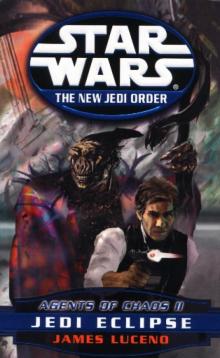 Star Wars The New Jedi Order - Agents of Chaos II - Jedi Eclipse - Book 5
Star Wars The New Jedi Order - Agents of Chaos II - Jedi Eclipse - Book 5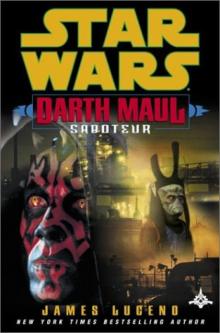 Star Wars - Darth Maul - Saboteur
Star Wars - Darth Maul - Saboteur Star Wars: Cloak of Deception
Star Wars: Cloak of Deception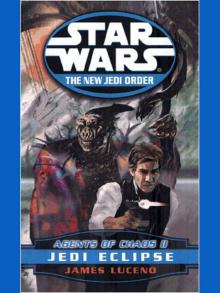 Star Wars: New Jedi Order: Agents of Chaos II: Jedi Eclipse
Star Wars: New Jedi Order: Agents of Chaos II: Jedi Eclipse End Game
End Game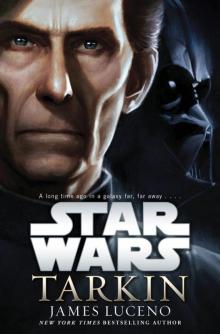 Tarkin: Star Wars
Tarkin: Star Wars Restraint
Restraint Star Wars - Cloak Of Deception
Star Wars - Cloak Of Deception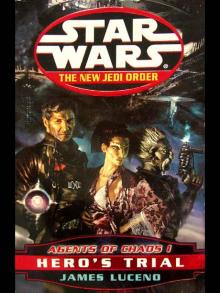 Star Wars: New Jedi Order: Agents of Chaos I: Hero's Trial
Star Wars: New Jedi Order: Agents of Chaos I: Hero's Trial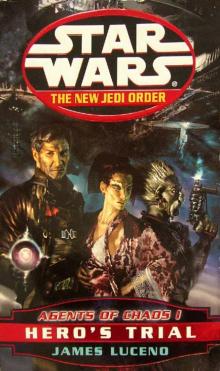 Star Wars The New Jedi Order - Hero's Trial - Book 4
Star Wars The New Jedi Order - Hero's Trial - Book 4 The Essential Novels
The Essential Novels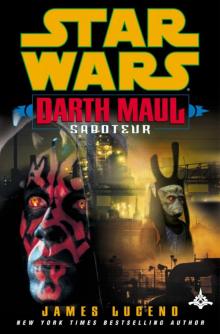 Darth Maul: Saboteur
Darth Maul: Saboteur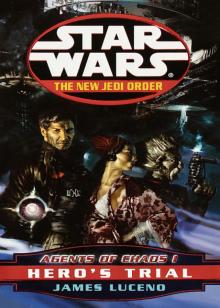 Hero's Trial: Agents of Chaos I
Hero's Trial: Agents of Chaos I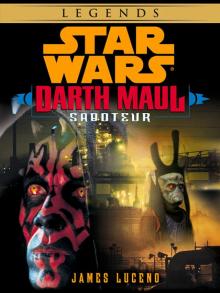 Saboteur
Saboteur The Unifying Force
The Unifying Force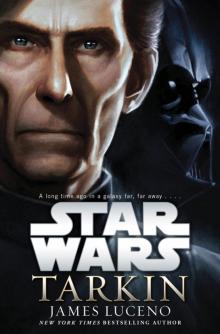 Tarkin
Tarkin Dark Lord : The Rise of Darth Vader
Dark Lord : The Rise of Darth Vader Catalyst
Catalyst Book 0 - The Dark Lord Trilogy
Book 0 - The Dark Lord Trilogy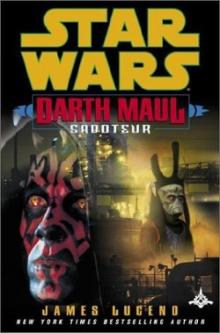 Darth Maul: Saboteur (star wars)
Darth Maul: Saboteur (star wars)